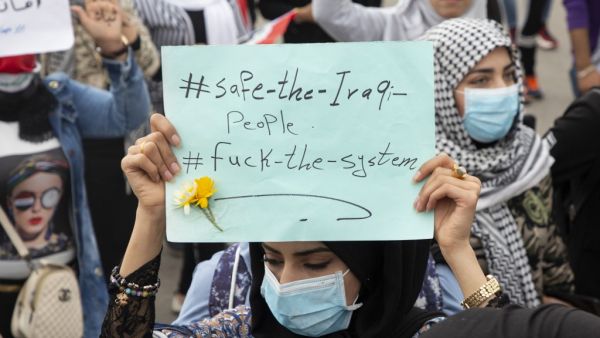Ali Khraybit’s best friend just proposed to a girl he met marching in Baghdad's Tahrir Square, the anti-government movement's epicenter.
Like other squares, Tahrir has become a social experiment, a free space where conservative norms have been toppled.
"We scored one goal by bringing down the government, but socially we achieved much more," Khraybit, 28, told Agence France Presse.
Since October, the country of 40 million has been rocked by a historically large grassroots movement with big goals: ending corruption, unaccountable sectarian parties and overreach from neighboring Iran.
Prime Minister Adel Abdel Mahdi resigned in December, only to be replaced by ex-minister Mohammad Allawi, slammed by protesters as too close to the ruling elite.
Students defy orders to return to class and neighborhoods once seen as dangerous are buzzing with people en route to demonstrate.
Slogans like "Forget outdated traditions," "End classism" and "No more differences" are trending on Twitter in Iraq.
"Tahrir lets us dream," wrote one activist whose friend -- who ekes out a living driving a rickshaw -- had fallen in love with a medic from a prestigious family.
"The young generation was in a coma for many years, but stability opened their eyes to the truth: there is more to life than just surviving," said protester Ahmad Haddad, 32.
"There's living in dignity in a civil society, breaking conservative norms," said Haddad.
But instead of easing into normality, it was a sudden uprising that transformed Iraq.
Hiyyam Shayea, a 50-year-old teacher in protest-hit Diwaniyah province, can testify to that.
"There were some huge, surprising changes to a lot of social affairs," said Shayea, wearing a traditional black robe at a recent rally in her hometown.
In Basra, Heba, a protester in her 20s, said the rallies have changed her.
"They strengthened our personalities, made us distinguish between right and wrong and demand our rights," she said.
The movement is now at a crossroads: numbers have dwindled as activists face an intimidation campaign and parties seek to recapture momentum with a new cabinet.
"Now, it's time to unite under a new vision, a plan that addresses Iraqis' needs," said protester Mohammad al-Ajeel.
"What's happening is huge, but it's new for us. We can't expect everything to happen overnight," said Ajeel. "It may need years."
This article has been adapted from its original source.








